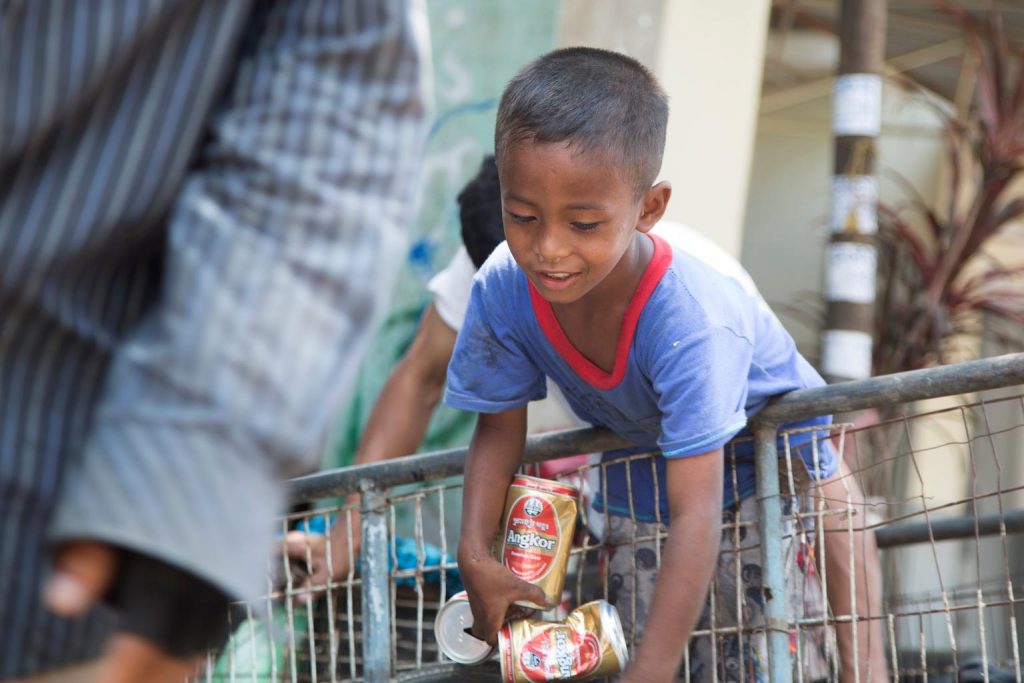This story of change pulls out the key findings and recommendations from EMERGE case study 3, which focuses on the work of KMG to eliminate female genital mutilation-cutting in Ethiopia.
Briefings
‘One hand can’t clap by itself’: Engagement of Boys and Men in KMG’s Intervention to Eliminate FGM-C in Kembatta Zone, Ethiopia

UNICEF/UNI165149/Lovell
Cambodia, April 2014. Six year old Chamroeun helps his mum, Sareth, collect rubbish to sell, every day in Cambodia's capital, Phnom Penh.
Sareth comes home at lunchtime, pulls a bundle of banknotes from her top pocket and starts counting. They add up to the equivalent of around 60 pence. Shes been out all morning collecting old cans and plastic bottles from the streets to sell in order to buy food for her family.
In October last year, Sareths six month old only daughter died after becoming sick with diarrhoea. I breastfed her in the morning, around 6 or 7 oclock, she says as tears fill her eyes, and then I went out to collect rubbish. At the time there was flooding and sewage up to here, she recalls, pointing to a waist height wooden slab, a makeshift bed where her daughter lay when she was sick. She holds her hands tightly together. We took her to the hospital but they couldnt help and she died. I feel so sad about it.
Sareth, 42, lives with her husband and three sons in an urban poor community just a stones throw from the main streets of Phnom Penh. They rent their home for £30 a month; a one room corrugated shelter, running alongside the polluted river. The overcrowded area, strewn with rubbish and defecation, is home to more than 2,700 people and its one of approximately 500 urban poor communities in the capital of Cambodia. Theres little space for children to play, and limited access to safe water, sanitation and healthcare.
Sareths husband comes out of their home clutching a photo of his baby daughter and its clear she is still at the front of all their minds. I tried to protect her from diseases but it was hard, Sareth continues. I dont understand how other children were fine, but not mine. Now I know the dangers of diarrhoea but I worry about it.
Around 50 children under the age of five die every day in Cambodia from diseases that can be easily prevented and treated, such as diarrh
See also
Briefings
What Social Sciences Researchers Working in Humanitarian Contexts (Sub-Saharan Africa) Should Be Asking in COVID-19 and Why
This brief was developed based on evidence and lessons learned from CASS studies, to guide social scientists working in humanitarian programmes, or actors seeking to use social sciences research inside their COVID-19 response in Sub Saharan Africa. It provides a…
UNICEF
2020
Related content
Infographics
Key Considerations: Child Engagement in the Context of Disease Outbreaks in Eastern and Southern Africa
This infographic summarises the insights from a recent key considerations brief on child engagement in the context of disease outbreaks in Eastern and Southern Africa. This brief explores why, when and how to engage children in the prevention, response and…
Central and East Africa Hub
SSHAP
2024
Infographics
Key Considerations for Responding to Floods in South Sudan Through the Humanitarian-Peace-Development Nexus
This infographic summarises the insights from a recent key considerations brief on responding to floods in South Sudan through the lens of Humanitarian-Peace-Development (HDP) Nexus. The brief describes the multidimensional impacts of flooding on peace, health, livelihoods and governance and…
Central and East Africa Hub
SSHAP
2024
Briefing
Key Considerations: Child Engagement in the Context of Disease Outbreaks in Eastern and Southern Africa
Effective child engagement strategies are essential to optimise the response to disease outbreaks and minimise their impact while ensuring children’s protection, well-being and resilience. When children understand disease outbreaks, they are better able to cope, contribute and recover. This promotes…
Central and East Africa Hub
SSHAP
2024
Briefing
Key Considerations for Responding to Floods in South Sudan Through the Humanitarian-Peace-Development Nexus
In common with many other African countries, the Republic of South Sudan is increasingly experiencing devastating floods linked to climate change.1,2 The Indian Ocean Dipole (IOD) and El Niño regulate the climate of Equatorial Eastern Africa. In 2019, a dipole…
Central and East Africa Hub
SSHAP
2024


